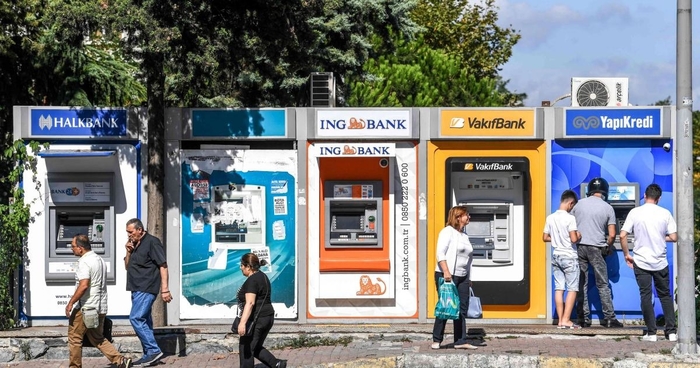
Banking in Turkey – A Guide for Expats and Foreigners
One requirement for most people who choose to live in Turkey is a Turkish bank account. It makes it much easier to pay bills and manage your day-to-day spending, and although some expats do rely on existing accounts in their home countries, they are few and far between.
Opening an account is relatively easy and, while there are certain rules that apply to foreigners, there are also many benefits to be had. Our guide tells you what to expect.
Choose your bank
People have different reasons for choosing a particular bank. They might want the reassurance of English-speaking staff in their local branch, or perhaps the number and location of ATMs is a consideration. There will be more in Antalya City, for example, than in a small village outside Alanya.
Some banks have an English language version of their website or smartphone app, but not all – so that might be something to think about if you need online banking. Most do have an English option at their ATMs.

Interest rates can also be a factor. Although the days of 40%-plus interest on savings are long gone, time deposit accounts can still yield a healthy sum each month, depending on your investment. Many banks offer a higher ‘welcome’ rate, but be aware this is often just for the first month; it will then drop.
It’s a good idea to ask around to get an idea of other people’s experiences with different banks. You might be drawn to HSBC because it’s a familiar name, for example, but you won’t be able to access your UK accounts via a Turkish bank.
Some banks are private, including Garanti, YapıKredi, Akbank and Denizbank, while others such as Halkbank, Ziraat and Vakıfbank are state-owned.
Opening an account
To open an account, you will need your passport, tax number and a utility bill, which can be either from Turkey or your home country. In some areas, banks require foreigners to have a valid residence permit before they are allowed to open an account. While this is more common in cities such as Istanbul, or with some state bank branches, it’s worth checking during your research.
If you don’t already have a tax number, you can get one free of charge by calling into your local tax office. You’ll need your passport, along with a colour photocopy of its picture page and most recent entry stamp page. Alternatively, you can apply online here. Scroll down and click the box that says Yabancılar İçin Potansiyel Vergi Kimlik Numarası (Yab-an-juh-lar itch-in Po-tan-see-el Verg-ee Keem-leek Num-a-ra-suh) – Application for Non-Citizen’s Potential Tax Number. You’ll be asked to upload an image of your passport’s picture page, fill in a security code, and then click ‘tamam’ (tam-am), or ‘okay’.
Is my money safe in Turkey?
Measures are in place to protect customers’ money in the event of a financial collapse. At each bank, each person is covered for up to 100,000 Turkish lira.
So, if you have accounts at three banks and all of them collapse, 300,000 TL of your money is safe. If you have one joint account, each of you is covered for 100,000TL, so 200,000TL of your money is safe. If you have three accounts at the same bank in one name, only 100,000TL in total is safe. (Of course, this assumes you have that much in your account; you are only entitled to the amount you have.)

Transfer options
A question asked by many expats is which option is best to transfer money from their home country into Turkey. While some arrange to have pensions paid directly into their Turkish account, for instance, others prefer to move it themselves.
Online services offer a convenient, easy way to move money at low cost. As an example, TransferWise offers an exchange rate comparable to the banks and charges a very reasonable fee, while XE offers free transfers at a slightly lower exchange rate. (You will need to check with your Turkish bank for any charges when the money is received in your account.)
Some people use credit or debit cards from their home country to withdraw foreign currency and then swap it for lira at the change offices. However, fewer ATMs are offering free withdrawals making this a more expensive option.
Some useful information
There are a few other points worth knowing when it comes to using the Turkish banking system.
- Mortgages. If you’re hoping to get a mortgage in Turkey as a foreigner, it is possible. However, tax requirements can be high so do your sums first. The maximum amount available is 60% of the sale price, and the maximum lending period is 15 years.
- You may not pay foreign currency cheques into a Turkish bank account.
- Banks in Turkey will not accept telephone instructions, so if you plan to spend large periods of time elsewhere, internet banking will be vital to managing your account, paying bills etc.
- You will need to tell your bank if you want to use your Turkish debit or credit card for online shopping; this is not automatically enabled.
- Consider currency fluctuations if you plan to transfer large sums to Turkey, particularly if you might need to change it back again. In 2014, with an exchange rate of around 3.5TL to the pound, £10,000 would buy you 35,000TL. If you were to change 35,000TL back to GBP at time of writing, six years later, you would only receive around £3,600.
Can we help?
If you’re ready to make the move to Turkey, we’d love to help you find your dream home in Antalya province. We’re also highly experienced in the buy-to-let property market. Whatever your needs, our team will be there every step of the way – just get in touch.
